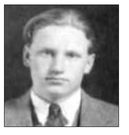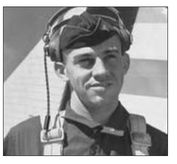War Stories II (19 page)
Authors: Oliver L. North

CORPORAL JACOB “JAKE” DESHAZER, USAAF
Plane #16, Doolittle Raid
3,000 Feet Above China
18 April 1942
Plane #16, Doolittle Raid
3,000 Feet Above China
18 April 1942

Our airplane flew farther than any of the rest of them. At 10:30 at night we were at 3,000 [feet] and the pilot said, “We're going to have to jump. Jake, you're first.”
I took a hold of the edge of the fuselage, pushed real hard, and jumped away from it. I counted to five real fast, pulled the ripcord, and the parachute opened up, and I thought, “I'm on the way now. I'm gonna get down.” And sure enough, I hit the edge of some kind of a rice field.
I tried to find a road or something that night, but I just went around in circles, so I came back to the same place where I started, found a place where I could get in out of the rain, and the next morning I started out looking for a road or some telephone lines. I found some kids about fifteen years old who had uniforms on. So I went up to them and asked them if they were Chinese or Japanese. And one fellow said, “Me, China.” I had my .45 all ready to go, because I was trying to find out if I was in free China or Japanese-occupied China. And they said, “Let's go down to the camp.” It was only about a quarter of a mile away.
But when I got there, they surrounded me and every bayonet was pointed right at me. So I let them have my gun. They fed me and then I found out that I was in the hands of the Japanese military. They had captured all five of us. That started my three years and four months in a Japanese prison.
A few days later they flew us to Tokyo and started asking us questions. The hardest part was to be questioned for twenty-four hours and then taken down to our cells and maybe get a piece of bread to eat with a little rotten potato-peel soup.
When they did give us a little sleep, it would be only an hour or so. I was all tied up, and if I squirmed around, the guard would hit me on the side of the head with his club. It was more than I could stand.
We were kept in solitary cells and questioned for sixty days. Dean Hallmark got dysentery so bad that we'd have to carry him over to the toilet. Later on they took Hallmark, Farrow, and Spatz away and executed them.

LIEUTENANT DICK COLE, USAAF
Plane #1, Doolittle Raid
3,000 Feet Above China
18 April 1942
Plane #1, Doolittle Raid
3,000 Feet Above China
18 April 1942

Paul Leonard bailed out first, then Fred Braemer, then Hank, and then me. I tried to see when I was going to hit the ground, but it was foggy and I couldn't see how high I was, until all at once I felt some leaves brushing my face just before I hit the ground.
I was probably the luckiest guy in the bunch. My chute drifted over a pine tree and so I didn't hit the ground very hard. I don't really recall much except that I made it down safe.
I waited until dawn, took out my compass, and just started to walk west. Toward evening I came to the edge of a cliff. And down below, there was a military compound flying a Chinese nationalist flag, so I went down there.
An hour or so later, Bombardier Fred Braemer came walking down the same path that I had followed. Neither of us could speak Chinese, so after a while, Fred and I used hand signals to let them know we wanted to leave.
This group obviously had some means of communications and they knew where they wanted to take us. We ended up in a headquarters with the Chinese general in charge of that area. By the time we arrived, Doolittle was already there. And in the meantime we'd picked up the fifth member of our aircrew, Paul Leonard.
They kept us there for about a week. And then they put us on a kind of river junk to keep us moving. Japanese patrol boats were going up and down the river with searchlights but we were never challenged.
They eventually brought us ashore and moved us over land on foot until we ended up in Hen Yang. A few days later a C-47 came in and picked us up and took us to Chungking. From there I was fortunate enough to eventually be returned to the United States.

Surprisingly, the first news of the raid came from Radio Tokyo, carrying broadcasts by Japan's furious military leaders, promising revenge. An announcement from Washington, a few hours later, was vague and terse: “American planes might have participated in an attack upon the Japanese capital.” But by the following day, though details were still scant, newspaper headlines across the U.S. trumpeted the news: “Tokyo Bombed in Broad Daylight,” “U.S. Warplanes Rain Bombs on Jap Empire,” and “U.S. Bombs Hit Four Jap Cities.” Pressed by reporters to explain how the B-25s had managed to get all the way to Japan, FDR said that they had launched from “Shangri-La.”
But while Americans celebrated the feat, many of the participants were still suffering. Pilot Ted Lawson, whose plane had crashed into the sea, had a crushed leg, and by the time the flight surgeon, Thomas “Doc” White, found him, the leg was rotting from gangrene. Doc White figured that to save Lawson's life, the leg would have to go.
Operating in a nationalist Chinese jungle encampment, the surgeon gave Lawson a spinal injection with Novocain to numb the pain, then used a hacksaw to methodically cut through the fetid flesh and thick leg bone. Lawson remained conscious throughout the long procedure, and when it was over, he watched quietly as Doc sewed up the wound and then used a hypodermic syringe to take his own blood to transfuse the traumatized patient. As a nurse carried the sawed-off leg outside the tent to dispose of it, Lawson said, “Thanks, Doc.”
Back home, little was initially known about the fate of most of the airmen. General Hap Arnold had received a coded message from Doolittle on 21 April, relayed through the nationalist Chinese. But all that Doolittle was able to report at the time was that the mission to bomb Japan was accomplished
and that bad weather, not a shortage of fuel, might mean that all sixteen of the B-25s had been lost. He also informed Washington that five American fliers had survived.
and that bad weather, not a shortage of fuel, might mean that all sixteen of the B-25s had been lost. He also informed Washington that five American fliers had survived.
By the time Doolittle arrived back in the United States, it was known that the Japanese had captured eleven of the airmen. What no one knew until much later was that they were all subjected to horrific torture and interrogation in an effort to discover how the attack could have taken place. Even after three of their number were executed by the Japanese, the Americans gave them only name, rank, and serial number.
All of the Doolittle Raiders were awarded the Distinguished Flying Cross for their heroism. FDR presented Lieutenant Colonel Jimmy Doolittle with the Medal of Honor and promoted him to brigadier general, allowing him to bypass the rank of colonel.
Of the eighty men who went on the mission, three were killed while jumping from their planes after the raid. Eleven were captured, and the Japanese executed three of them on 15 October 1942. Another prisoner died of maltreatment by his captors, and four others were released when the war ended, following three and a half years of imprisonment.
Most of the Doolittle Raiders were reassigned after they returned to the United States and volunteered to fly combat missions elsewhere. Ten of them were killed in action, in North Africa, Europe, and Indochina, and four others were shot down in the European theater and captured by the Germans, who held them for the duration of the war.

At the U.S. Air Force Academy in Colorado Springs, a carefully protected display case holds eighty silver goblets, each engraved with the name of a Doolittle Raider. Every 18 April, the goblets are used at a reunion of the surviving Doolittle Raiders, in a private and emotional ceremony. They toast their comrades, living and dead, and reminisce. The goblets of those who have passed on since the last reunion are inverted inside the case. And one day soon, all the goblets will be upside down.
CHAPTER 5
AN AWAKENED GIANT: THE BATTLE OF THE CORAL SEA
(MAY 1942)
 HQ U.S. PACIFIC FLEET
HQ U.S. PACIFIC FLEETPEARL HARBOR
OAHU, HAWAII
5 MAY 1942
OAHU, HAWAII
5 MAY 1942
J
immy Doolittle's daring raid from the deck of the USS
Hornet
on 18 April 1942 did little damage to Japanese warmaking capability. But bombing the emperor's cities seriously alarmed military planners in Tokyoâand precipitated decisions they would soon regret.
immy Doolittle's daring raid from the deck of the USS
Hornet
on 18 April 1942 did little damage to Japanese warmaking capability. But bombing the emperor's cities seriously alarmed military planners in Tokyoâand precipitated decisions they would soon regret.
Other books
The Shadow of the Wind by Carlos Ruiz Zafón
Cat Sitter Among the Pigeons by Blaize Clement
Cinders' Bride: Mail Order Brides of Texas by Ball, Kathleen
Double Indemnity by Maggie Kavanagh
Animal 2 by K'wan
Hercules: The Legendary Journeys Two Book Collection (Juvenile) by David L. Seidman
B017GCC62O (R) by Michelle Horst
A More Perfect Union: What We the People Can Do to Reclaim Our Constitutional Liberties by Carson MD, Ben, Carson, Candy
Skygods (Hydraulic #2) by Sarah Latchaw
